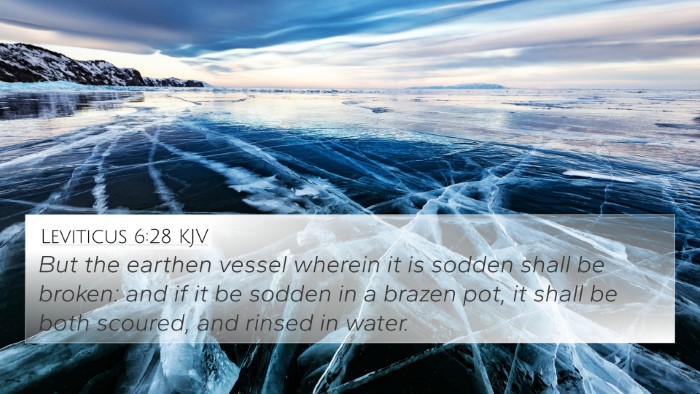Meaning and Interpretation of Leviticus 11:33
Leviticus 11:33 states: "And every earthen vessel, whereinto any of them falleth, whatsoever is in it shall be unclean: and ye shall break it." This verse serves as a significant point within the larger context of the dietary laws presented in Leviticus. It focuses on the regulations concerning cleanliness and holiness regarding the consumption of animals. Here we will explore insights from public domain commentaries regarding the implications and applications of this passage.
Contextual Understanding
Leviticus primarily outlines laws for the Israelites, emphasizing the need for purity and distinction between clean and unclean animals. This particular verse highlights not only the physical cleanliness of the animals they consume but also the broader theme of spiritual cleanliness. The earthen vessel mentioned here is not merely a container but symbolizes the broader concept of being set apart for God.
Insights from Commentaries
-
Matthew Henry:
Henry emphasizes that the laws governing cleanliness were part of a broader covenant with the Israelites that demonstrated their separation from other nations. The breaking of the earthen vessel signifies a complete rejection of that which is unclean, serving as a metaphor for the need for the people to reject sin and anything that would contaminate their relationship with God.
-
Albert Barnes:
Barnes points out that the physical act of breaking the vessel illustrates the severity of contamination that can arise through inattention to God’s laws. This was not just a ritualistic practice but carried a deep significance, reminding the Israelites that their actions have spiritual repercussions. The breaking of the vessel is a physical manifestation of the spiritual implications of neglecting cleanliness.
-
Adam Clarke:
Clarke highlights that the term "earthen vessel" refers to common, everyday items that serve a crucial function yet are susceptible to pollution. His commentary notes that this reflects God’s intent to keep His people consistently aware of His holiness—such vigilance should extend to all areas of life, ensuring that nothing impure infiltrates their worship or daily living.
Thematic Connections to Other Scriptures
The verse’s call for purity and the breaking of the unclean vessel connects to several other scripture passages that emphasize holiness and purity. Below are some significant cross-reference verses related to Leviticus 11:33:
-
Leviticus 10:10:
“And that ye may put difference between holy and unholy, and between unclean and clean.” This reinforces the notion of distinguishing between what is permitted and what is not.
-
Isaiah 52:11:
“Depart ye, depart ye, go ye out from thence, touch no unclean thing; go ye out of the midst of her; be ye clean, that bear the vessels of the Lord.” This mirrors the sentiments in Leviticus about being clean to serve God.
-
2 Corinthians 6:17:
“Wherefore come out from among them, and be ye separate, saith the Lord, and touch not the unclean thing; and I will receive you.” New Testament believers are called to maintain this standard of purity.
-
Hebrews 12:14:
“Follow peace with all men, and holiness, without which no man shall see the Lord.” This indicates the enduring importance of holiness in the relationship with God.
-
Matthew 5:8:
“Blessed are the pure in heart: for they shall see God.” This illustrates the inner purity needed to experience God’s presence.
-
1 Peter 1:16:
“Because it is written, Be ye holy; for I am holy.” God calls His people to emulate His holiness.
-
James 1:27:
“Pure religion and undefiled before God and the Father is this, To visit the fatherless and widows in their affliction, and to keep himself unspotted from the world.” This verse reiterates the concept of purity in action.
Practical Applications
Understanding Leviticus 11:33 provides invaluable insights into both historical and contemporary contexts for believers. The key takeaway is the importance of maintaining purity in every aspect of life, including thoughts, actions, and relationships, similar to how one navigates the complexities of life while adhering to spiritual principles.
Through this verse, we learn the importance of vigilance in our spiritual lives. Just as the Israelites were instructed to break any contaminated vessels, we are encouraged to eliminate anything in our lives that could hinder our relationship with God.
This passage also opens up opportunities for thematic Bible verse connections, linking the Old Testament laws to the New Testament teachings about purity and holiness, showing an inter-Biblical dialogue that emphasizes a consistent theme throughout scripture.
Conclusion
Leviticus 11:33 serves as a reminder of the critical nature of spiritual cleanliness and the ongoing relevance of these laws for believers today. By employing tools for Bible cross-referencing and understanding the connections between these verses, believers can better appreciate the depth of God’s instructions for holy living.
Engaging with this verse prompts a thorough examination of our lives, encouraging us to ask: what must we "break" in our lives to remain true to our calling as followers of Christ?









